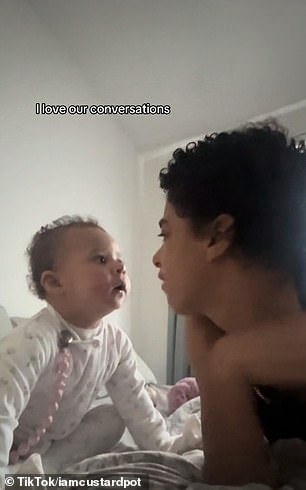A baby’s Scouse babble recently took the Internet by storm with millions of views on TikTok, in what experts say is a ‘striking’ example of how our language develops.
In the clip, now viewed over 17million times, the 19-month-old girl ‘converses’ in a distinctly Liverpudlian accent to her aunty after being told its bedtime.
Posted by account @iamcustardpot and captioned ‘I love our conversations’, the clip sees the baby seemingly answer with a shake of the head and what sounds like “No” in a throaty Scouse intonation before continuing to babble adorably.
Experts told MailOnline the clip was unusual and showed just how much babies absorb aspects of the language spoken by those around them.
Professor Caroline Floccia, an expert in developmental psychology from the University of Plymouth, told this website what we’re hearing in the clip is the baby mimicking the prosody, or the melody, of the Scouse accent.
‘It’s striking because the baby, at 19-months, is quite young but already has a quite advanced language for their age,’ she said.
‘She does quite long utterances, long sentences, which gives you plenty of opportunity to hear that melody.
‘She’s not really putting words together, she’s imitating and learning the prosody of the language.
‘Everyone notices it a bit more because it’s not the standard British pronunciation.’
She added that while the Scouse baby’s long sentences of speaking were unusual for her age she was, in principle, demonstrating how every child learns to speak.
‘It’s exactly what every child does. Language learning starts in the womb, in the last three months before birth.’
Professor Floccia said previous studies have shown that even very young babies ‘cry’ in different languages with the wail from infants from French speaking households being slightly different to those from German speaking counterparts.
She said babies first learn how a language sounds, the melody, before they ever learn specific words and meanings.
During this time, rather than words, they first start detecting the melody of the language in their surroundings which then goes on to develop as they age.
Professor Floccia added, that while there wasn’t any current data to support this, some accents with a stronger melody such as Liverpudlian might be more noticeable to the ear then those with a more subtle pattern.
And she said that the environment appears to play a stronger role than any specific parental accent.




The baby, who can’t yet talk, appeared to respond directly to questions – albeit in a Liverpudlian accent
She said, while data was still emerging, anecdotal observations indicated that babies growing up in household with a parent with a foreign accent won’t pick this up.
‘So, they never learn English with a French accent or with a German accent for example,’ she said.
Professor Floccia said ‘every practitioner in the world’ rightly encouraged parents to talk to their babies as much as possible as it helps them develop their own language skills.
‘The more they are exposed to language, in terms of quantity but also in terms of quality, the richer their language will be,’ she said.
She also said that clinicians typically to look for babies to start to form basic two-word phrases by the age of two.
Dr Dan Wuori, an expert in parenting and child development said the video was an example of how perceptive babies are to how the people around them speak.
Writing on X he said: ‘As hearing becomes functional during the third trimester, infants are exposed to the distinct patterns of their mothers’ native language – with studies suggesting newborns can already distinguish (and prefer) what will become their native tongue only hours after birth.
‘We’re only just beginning to understand the deep learning that begins in utero.
‘It’s just more evidence that the period from prenatal to three is the most critical window in all of human development.’
But the Scouse baby isn’t alone. Social media is awash with other examples of babies and young children ‘speaking’ in certain accents.
Last year, TikTok user @459cja posted a video of a Scottish baby appearing to say something approximating ‘Oh you, what are you doing calling Eilidh’.
And Jessica Di Santo, a mother-of-two from Melbourne Australia, posted another example which shows it’s not just the sound of language babies pick up on.
In the adorable clip, her son Leonardo is seen mimicking the hand gestures made by his Italian grandfather as he speaks on the phone.
Source: Mail Online






